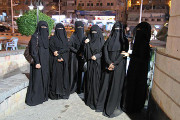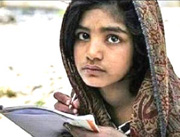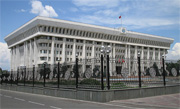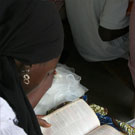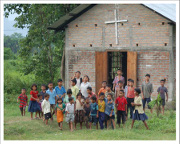Yesterday’s confidence replaced by fear that judge will yield to mob
LAHORE, Pakistan, Aug. 30 (Open Doors News) — Confident on Wednesday of Rimsha Masih’s release, her lawyer was apprehensive Thursday after a prosecutor hinted strongly at the likelihood of violence if she is freed.
"This girl is guilty,” said Rao Abdur Raheem, a lawyer for the man who has accused the girl of blasphemy against Islam. “If the state overrides the court, then God will get a person to do the job.”
One of Rimsha’s lawyers, Tahir Naveed Chaudhry, called Raheem’s remarks “an open threat” meant to cow the court into trying the girl as an adult, thereby exposing her to the possibility of the harshest penalties possible, including death.
Thursday’s dramatic turn followed Tuesday’s release of a medical report that determined the girl to be 14 years old. Naveed said Wednesday the report was powerful evidence that would persuade the court to shift Rimsha’s case to the juvenile courts, where potential penalties are less severe.
Instead, the local court in Pakistan’s federal capital adjourned Rimsha’s bail hearing Thursday after Raheem disputed the medical report’s legitimacy. Rather than make a ruling, the judge kicked the matter into Saturday.
Rimsha, a resident of an impoverished Christian sector of Islamabad, was reported to police Aug. 17 on the testimony of neighboring Muslims who accused her of carrying burned pages of Quranic verses. Her defense argues she is too young to face blasphemy charges as an adult, and too mentally handicapped to even understand the concept of blasphemy.
Raheem, who presented his papers in court Thursday, challenged the medical report on the basis that the panel that produced it was not convened by the court, but by a subordinate magistrate. The report was issued, he said, a day before the court itself issued an order convening a medical panel.
He asked the court to annul the report because “the doctors and the State were supporting the Christian girl,” and to form a new board to determine her age while leaving alone the question of her mental capacity. Christian advocacy groups have suggested the girl suffers from Down syndrome, which is associated with learning disabilities.
“The medical report on Rimsha is illegal, as it followed the orders of a civil servant and not the court, and went beyond its remit of determining her age,” Raheem told news reporters. “The government is supporting her and manipulating court proceedings.”
Rimsha’s arrest has prompted widespread condemnation of Pakistan’s anti-blasphemy laws. Pakistan President Asif Ali Zardari has ordered an investigation, and has said the law must not be used to settle personal scores.
Other prominent government figures, including Punjab provincial Governor Salmaan Taseer, have been killed after publicly urging reform of the blasphemy laws. Raheem served as an attorney to Taseer’s assassin, Malik Mumtaz Qadri.
”Every person advocating (Rimsha’s) release should know that if she is allowed to walk free, there are many Mumtaz Qadris in this country,” Raheem said Thursday to a large number of reporters at the court hearing.
"If the court is not allowed to do its work, because the state is helping the accused, then the public has no other option except to take the law into their own hands," he said.
Naveed, the attorney for the girl, told Open Doors News that even though there is no legal justification to refuse bail to his client, Raheem’s dark talk is likely to influence the judge’s decision on Saturday.
“Raheem’s reference to many more Qadris in Pakistan is an open threat to the judge, and to us,” said Naveed, who also is a member of Pakistan’s Punjab provincial assembly. “Everyone knows that extremist elements can go to any lengths to impose their will. We have recorded his public statement and will ask the court to take notice of it but I fear the situation will be very volatile when we appear in court on Saturday.”
A Lahore High Court judge, Arif Iqbal Bhatti, was gunned down in his chambers in 1997 after he acquitted two Christian brothers, Salamat Masih and Rehmat Masih, in a blasphemy case. Since then, several people accused of blasphemy have spent years in prison awaiting a judge willing to take up their appeals.
Naveed said the judge who had been assigned Rimsha’s case was on leave and would be resuming his duties Saturday.
“Although the case is quite clear, it solely depends on the judge if he is willing to show courage and release the poor child on bail,” he said. “In a recent case, a judge refused to give bail to a Christian man falsely accused of blasphemy on the pretext that he was safer inside the jail. So you can understand that the judges are also under immense pressure, and since this case has already attracted immense media coverage and consequently attention of extremist elements, I can just hope and pray God works in this situation.”
Napolean Qayyum, leader of the Pakistan People’s Party Minorities Wing and field director of Christian organization World Vision in Progress, told Open Doors News that in his several years in the field pursuing persecution cases, almost all people charged under the blasphemy laws are convicted by judges under mob pressure.
“Religious elements gather outside courtrooms on every hearing and the poor judge has no choice but to convict the accused. The same thing happened in the case of Aasia Bibi and I fear that now these Islamist elements will try to pressure the judge hearing Rimsha’s case in similar manner,” he said.
Qayyum said that the Chief Justice of Pakistan should take notice of the situation and form a judicial panel to investigate the case. “Lower courts cannot withstand public pressure so a high-powered judicial commission stands a better chance of digging out the truth.”
As for Rimsha’s safety, Naveed said the girl’s legal team is prepared to move her to a safer location as soon as the judge orders her release on bail. He also has said it is unlikely she or her family would ever be able to return to their home in the Meherabad sector of Islamabad.
He rejected the notion that Rimsha would be safest if kept in jail, even if declared a juvenile, until her trial. “The law provides relief of bail to juveniles and she should be set free,” he said.
Human rights lawyer and activist Hina Jillani told Open Doors News that Pakistani law provides relief to women and children and in this case it is evident the Christian girl is not only a juvenile but also mentally handicapped.
“Under Article 25 of Pakistan’s constitution, it is the State’s responsibility to ensure the protection of women and children and this specific case involves a girl child so the government must ensure her security,” she said.
Hina lamented that only a few people in Pakistan had the courage to speak out against the misuse of the blasphemy laws, which often are used to settle personal vendettas. “It is unacceptable that we continue to persecute Pakistan’s minorities with such laws. Our minorities are very much a part of Pakistan as Muslims and it is the State’s responsibility that justice is administered and no vulnerable community is targeted by religious zealots.”
Naveed, a member of the All Pakistan Minorities Alliance of the late Christian minister Shahbaz Bhatti, said the government is extending all possible support, but acknowledged it may not be enough.
“Who can guarantee complete security but God?” he said. “I am greatly disturbed by Raheem’s threatening statement, but I trust God will keep all of us in His protection.”
END
**********
Copyright 2012 Open Doors News


